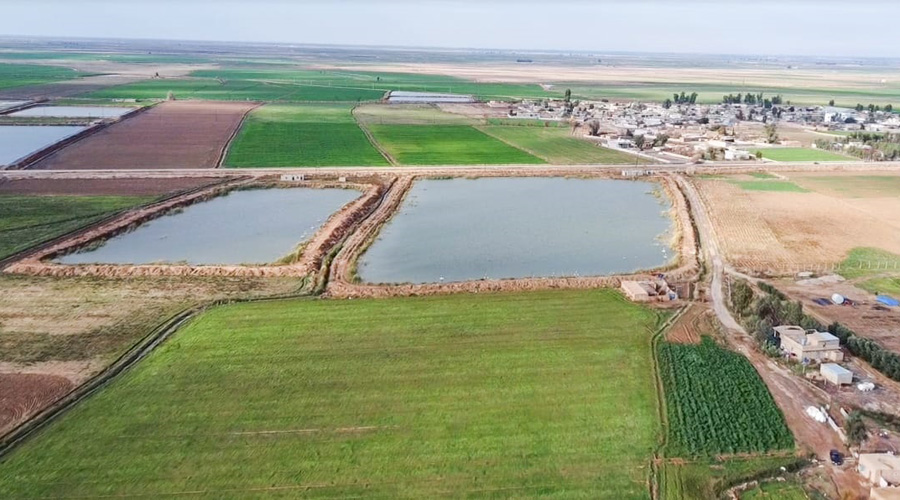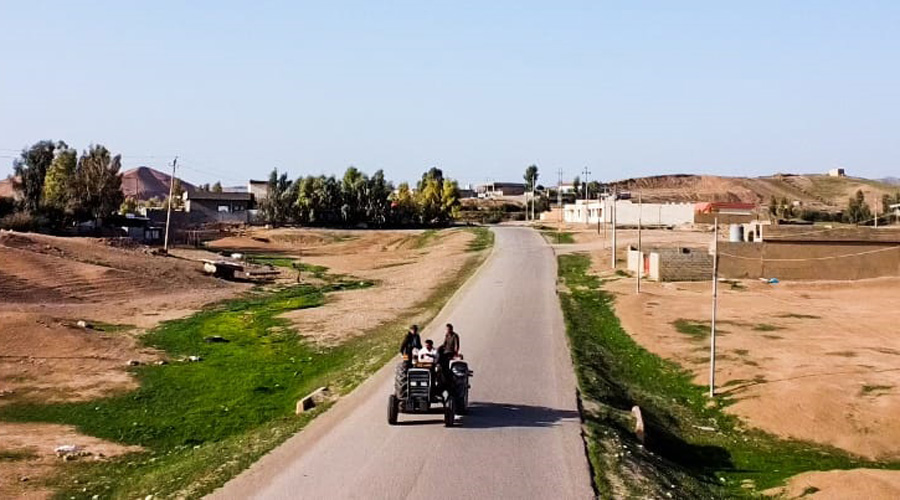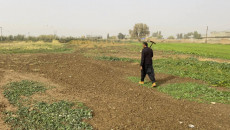The Kirkuk Agriculture Department and the provincial representatives in the Iraqi parliament are seeking to solve the problem of thousands of farmers in the province, whose agricultural crops have been withheld by the Iraqi government for years.
In 1987, the Revolutionary Command Council, during the rule of the Baath Party led by Saddam Hussein, issued a decision to cancel the right of disposition for 171,000 dunums of agricultural land in the northern oil-rich province of Kirkuk and transfer its ownership to the Ministries of Agriculture, Defense and Finance.
The farmers were tenants of the state farmlands and had the right of disposition up to the day it was cancelled and acquired by the state for several ministries.
As a result, the government refrains from providing assistance to farmers who are still cultivating the farmlands and refuses to receive their crops.
Omar Ahmed, a 69-years-old farmer from the village of Hassar of Shwan sub-district, told (KirkukNow), "77 dunums of my agricultural lands have been acquired and we do not receive any support from the government while plowing our lands, so we have to spend large sums annually to buy fertilizers, seeds, machine fuel and other supplies, and when our crops are ripe, they (the state) refuse to receive it.”
The government annually provides through the directorates of agriculture fertilizers, seeds, fuel and some other requirements to the farmers, but the farmers lost the right of disposition are deprived of these privileges.
The government has refused to receive our crops for 19 years even though we have ownership documents
Sardar Nazim, a farmer from Daquq district, who owns with his brothers and cousins 42 dunums of agricultural land covered by the state revision of the agricultural contracts, said, "We have not benefited at all from the government support provided to farmers. The government must find a solution to the problem of these lands. The Iraqi and Kurdistan Regional governments have not sorted out our issue in 19 years.”
The Iraqi government annually purchases wheat, barley and corn crops from farmers, but refuses to receive it from farmers whose land ownership has been transferred to some ministries.
The director of the Kirkuk Agriculture Department, Zuhair Ali, affirmed the farmer deliver crops to the state must have in possession copy of deed or a legal contract in order for the government to deal with him legally, but “the lands acquired (by the state for third parties) have no legal documents, so the government refuses to receive their crops.”
Zuhair Ali stressed that the Department of Agriculture sent a letter to the Ministry of Agriculture expressing approval to receive the crops of these farmers until the problem of their agricultural lands is resolved.

Kirkuk, center of the disputed territories between Baghdad and Erbil has 1.5 billion square meters of agricultural farmlands, out of which 0.9 billion is allocated for wheat, 2020 statistics of directorate of Kirkuk agriculture show.
Absence of state support and poor rainfall has sharply dropped down production of crops. Kirkuk meteorology said total rain in 2021 was only 104mm compared to 283mm in 2020 and 535mm in 2019.
Representatives and legal experts confirmed in previous statements to KirkukNow the solution to the problem of these lands must be through the Iraqi parliament, because the decision to cancel the right of disposition of farmlands was made by a decision of the Revolutionary Command Council, which legal and valid unless annulled by a law endorsed by the Iraqi parliament
There have been many attempts to solve this problem, but the matter needs to reach an agreement
Dylan Ghafoor, a Kirkuki member of the Iraqi parliament MP and a leader of the Patriotic Union of Kurdistan, said, "There have been many attempts to solve this problem, but the matter needs to reach an agreement."
"We assure the farmers that the government will receive their crops this year...We have done a good job and our endeavors started since the previous parliamentary session" said Ghafoor whom served as MP in the previous term of 2018 to 2021.
The disputed agricultural lands of expelled Kurdish and Turkmen farmers were distributed to the Arabs in the form of contracts per a decision of the Revolutionary Command Council of Ba'th Party chaired by Saddam Hussein which is valid up today since its abolition requires a counter law by the Iraqi parliament.
The history of this conflict dates back to the period of the rule of the Baath Regime in 1970s while successive parliaments and governments in Iraq post 2003 have failed to find radical solutions.
In the 1970s, the Socialist Arab Baath Party chaired by Saddam Hussein, distributed most of the agricultural farmlands of Kurdish and Turkmen farmers in several areas of Kirkuk to Arab settlers brought from central and southern Iraq, in the form of agricultural contracts.
These contracts continued up to the fall of the Baath regime in 2003. Then, the Kurd and Turkmen real owners returned to their lands and have been cultivating those lands for the last 18 years.
Located 238 kilometers north of Baghdad, the oil-rich city of Kirkuk is an ethnically mixed province for 1.6 million Kurds, Arabs, and Turkmen, Muslims, Christians and Kaka'is. It has long been at the center of disputes between Baghdad and Erbil.
Sirwan Zirar, a farmer in Sargaran district, west of Kirkuk, who owns 108 dunams of agricultural land that was covered by the decision, said, "I have been planning for six months to establish a large poultry project and a fish pond on these lands, but I was not allowed as the lands have been acquired."
"Last year, I planted some crops in it, but the government did not help me, and it did not receive my crops. As a result, I incurred losses amounting to three million dinars ($2,400)," said Zirar.
On the results of their recent efforts, the director of Kirkuk Agriculture, Zuhair Ali, said, "The government has not responded to our demands regarding receiving farmers' crops."






